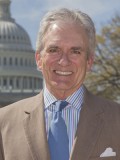By E xecutive Director J. Brent Walker
xecutive Director J. Brent Walker
Throughout my final year as executive director of the Baptist Joint Committee, I plan to use this column to discuss what I judge to be some crucial and indispensable principles that have informed and undergirded my understanding of a proper relationship between church and state in the context of American democracy.
The first one — and maybe the most important — is the idea that government must be neutral with respect to religion. Under the First Amendment, government must not promote religion (no establishment) and it must not inhibit religion (free exercise). Instead, in the words of my friend Marv Knox at the Baptist Standard, government must “butt out of religion, from both giving religion a helping hand and impeding it with regulations.” Stated differently, government must be neutral — disengaging from religion and allowing American citizens to make their religious choices voluntarily.
This fundament was challenged recently by Supreme Court Justice Antonin Scalia when he told a group of Louisiana high school students that, while we can’t favor one religion over another, there is absolutely nothing wrong with government favoring religion over irreligion. Justice Scalia could not be more wrong.
Neutrality means, at a bare minimum, that our government cannot set up an official national or state church. This theocratic arrangement is the antithesis of neutrality. I agree with Justice Scalia that neutrality also means that government cannot favor one religion over another. It cannot pick and choose favorites. But, neutrality also presupposes that government cannot favor religion over irreligion.
Let me tell you why I think this is so. The First Amendment bars “an establishment of religion.” Not “a” religion or “one” religion over another, but religion generally, period. In fact, the Framers turned away several proposals that would have explicitly allowed non-preferential aid to religion across the board. Instead, they adopted the expansive and unqualified clause banning an establishment of religion. Justice Scalia, who purports to be bound by the text on how he interprets founding documents, should understand as much.
Another reason why government should not be permitted to try to promote religion over irreligion is that it is never truly able to do so. Whose religion are we going to bless? In a democracy, the government will always tend to favor the majority religion. Hey, that’s where the votes are, right? Justice Scalia is a Roman Catholic, a powerful religious body that continues to exhibit majoritarian thinking. I wonder if he would have been so sanguine 150 years ago when Catholics were a persecuted minority, often denied religious liberty and even civil rights.
Even if it were possible to promote all religion evenhandedly, it still would prejudice our nonreligious citizens – now amounting to almost one in four Americans. Freedom of religion and for religion presupposes and embodies freedom from state-sponsored religion.
Now let me tell you what my insistence upon preventing government from promoting religion over irreligion does not mean.
First, it does not mandate a “naked public square”— the notion that religion cannot or should not be discussed in the political arena. Justice Scalia’s suggestion that this is the case — that religion is being stripped from the public square — is simply a straw man. Government neutrality does not mean that religion’s voice is shorn from the public conversation. Indeed, people of faith populate our politics, and religious speech pervades our political culture to a degree that far surpasses any other advanced western democracy.
It does not mean that religious beliefs and values cannot motivate or inform our public policy positions. Justice Scalia went on to theologize a little by speculating that one reason God has been good to America is that we have been willing to pay God honor. His presumptuous claim to know the mind and motives of Almighty God is not improper. If that’s what he believes, he is free to say so. The problem is that — in my opinion — it leads him to the wrong conclusion about the meaning and value of neutrality.
And, finally, it does not mean that we Americans cannot mention God in our pledge, motto and public rituals and ceremonies. BJC Blogger Don Byrd said it well: “It is true that the Court has upheld references to God in presidential proclamations, and on currency, or to solemnize certain official occasions. However, they have understood those references as a ceremonial acknowledgment of the role of faith in our country and its history and not as an official endorsement of religion.”
Justice Scalia’s position is not new. Perhaps more famously, then-Justice William Rehnquist took the same position in a dissenting opinion in Wallace v. Jaffree (1985) — a case about moments of silent prayer in public schools. In modern church-state jurisprudence, allowing government to promote religion over irreligion has always been a minority position. But, the fact that it has persisted for the past three decades after Justice Rehnquist first expressed that sentiment only heightens the importance of speaking out forcefully in opposition to that flawed thinking.
The continued vitality of our religious liberty in this country depends on our ability and willingness to do so.
From the January 2016 Report from the Capital. Click here to read the next story.





